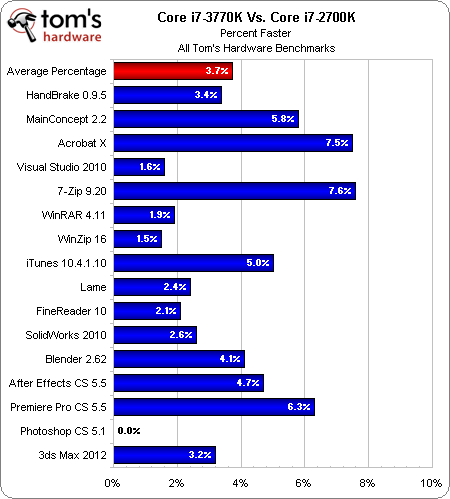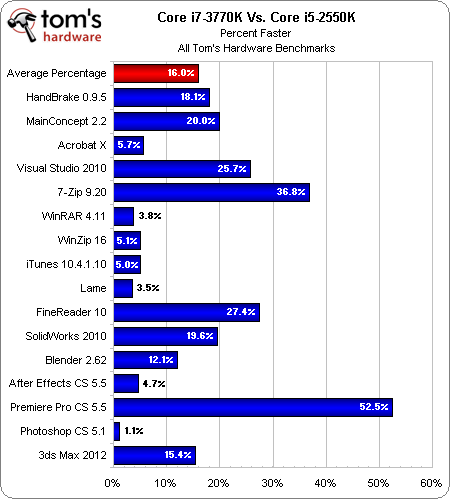Intel Core i7-3770K Review: A Small Step Up For Ivy Bridge
How Much Faster Is Core i7-3770K Than -2700K And i5-2550K?

As a host processor, Core i7-3770K is only marginally faster than the former flagship of Intel’s Sandy Bridge family, Core i7-2700K.
Sure, there are gaming numbers from HD Graphics 4000 and improved Quick Sync results we could talk about here, but this $317 chip’s job is as a CPU, first and foremost.

If a less expensive Core i5-2550K was good enough for you in a world where Core i7-2700K represented the fastest LGA 1155 processor you could buy, than it should be good enough for you in a world suddenly populated by Ivy Bridge-based chips, too.
Clearly there are workloads where buying an i7 warrants spending $100 more, though. Premiere Pro render jobs and Visual Studio projects are some of the most taxing in our suite—both get big boosts from the additional L3 cache and Hyper-Threading support offered by the highest-end mainstream CPUs.
Stay On the Cutting Edge: Get the Tom's Hardware Newsletter
Get Tom's Hardware's best news and in-depth reviews, straight to your inbox.
Current page: How Much Faster Is Core i7-3770K Than -2700K And i5-2550K?
Prev Page Power Consumption And Efficiency Next Page An Evolution That Makes Sense, But Doesn't Impress-
tecmo34 Nice Review Chris...Reply
Looking forward to the further information coming out this week on Ivy Bridge, as I was initially planning on buying Ivy Bridge, but now I might turn to Sandy Bridge-E -
jaquith Great and long waited review - Thanks Chris!Reply
Temps as expected are high on the IB, but better than early ES which is very good.
Those with their SB or SB-E (K/X) should be feeling good about now ;) -
xtremexx saw this just pop up on google, posted 1 min ago, anyway im probably going to update i have a core i3 2100 so this is pretty good.Reply -
ojas it's heeearrree!!!!! lol i though intel wan't launching it, been scouring the web for an hour for some mention.Reply
Now, time to read the review. :D -
zanny It gets higher temps at lower frequencies? What the hell did Intel break?Reply
I really wish they would introduce a gaming platform between their stupidly overpriced x79esque server platform and the integrated graphics chips they are pushing mainstream. 50% more transistors should be 30% or so more performance or a much smaller chip, but gamers get nothing out of Ivy Bridge. -
JAYDEEJOHN It makes sense Intel is making this its quickest ramp ever, as they see ARM on the horizon in today's changing market.Reply
They're using their process to get to places they'll need to get to in the future -
verbalizer OK after reading most of the review and definitely studying the charts;Reply
I have a few things on my mind.
1.) AMD - C'mon and get it together, you need to do better...2.) imagine if Intel made an i7-2660K or something like the i5-2550K they have now.
3.) SB-E is not for gaming (too highly priced...) compared to i7 or i5 Sandy Bridge
4.) Ivy Bridge runs hot.......
5.) IB average 3.7% faster than i7 SB and only 16% over i5 SB = not worth it
6.) AMD - C'mon and get it together, you need to do better...
(moderator edit..) -
Pezcore27 Good review.Reply
To me it shows 2 main things. 1) that Ivy didn't improve on Sandy Bridge as much as Intel was hoping it would, and 2) just how far behind AMD actually is... -
tmk221 It's a shame that this chip is marginally faster than 2700k. I guess it's all AMD fault. there is simply no pressure on Intel. Otherwise they would already moved to 8, 6, and 4 cores processors. Especially now when they have 4 cores under 77W.Reply
Yea yea I know most apps won't use 8 cores, but that's only because there was no 8 cores processors in past, not the other way around
